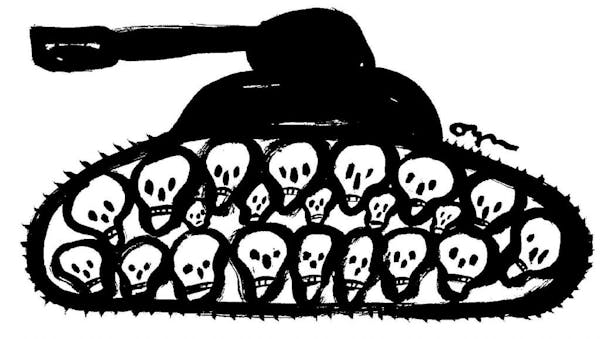Counterpoint
In a stirring opinion piece ("'Never again,' it's been said of genocide. Do we finally grasp it?" Jan. 19), Ellen Kennedy argues that people and nations have a responsibility to protect (R2P) vulnerable people who are at risk of genocide. In an equally thoughtful response ("Responsibility to protect is a power play," Jan. 25), Diana Johnstone writes that R2P -- the idea that the world community should intervene when a country experiences genocide or potential genocide -- inevitably leads to greater catastrophes.
Permit me to enter the fray as a Holocaust survivor.
Kennedy supports the United Nations "Outcome Document," noting that it is the responsibility of the international community to protect vulnerable citizens from genocide, war crimes, ethnic cleansing and crimes against humanity. Johnstone asserts that the intervention of one nation into the affairs of another is likely to lead to war, killing innocent civilians in greater numbers than ethnic cleansing. She argues, for example, that the murder of the Jews was part of World War II and that the genocide in Rwanda was a reaction to an invasion from Uganda.
My experience in Nazi Germany in the 1930s suggests that the Holocaust began long before the world war started in September 1939. The Holocaust and World War II are not synonymous. Hitler became chancellor of Germany on Jan. 30, 1933. The Dachau concentration camp opened on March 22, 51 days later. Preparing kosher meat according to Jewish tradition was forbidden by the end of April, followed quickly by the boycott of Jewish merchants. Early intervention by the international community might have prevented the genocide that followed.
Here I mean intervention in any of its many forms. R2P and the U.N. documents advocate using a long list of political, legal and economic remedies before putting boots on the ground. Military intervention is always a last, desperate and undesirable action.
I was born in September 1933, eight months after Hitler came to power. I was born in a Catholic infants home because health care for Jews was already limited and the nuns were willing to risk caring for a Jewish woman and her baby. In 1935 the Nazis passed the Nuremberg Laws, which stripped me and my family -- and all German Jews -- of citizenship and its rights and forbade marriages between Jews and Aryans.
Where were the international onlooker nations when the benches in Goethe Platz, the park at the end of our street in Hannover, Germany, had new signs erected in 1937 reading "Nur für Arier" (Only for Aryans)? When the Gestapo came to our homes looking for radios, we wondered if the world was watching. How could civilized nations permit the Nazi rampage? The early warning signs continued but there was no war. No one cared.
And then we witnessed the broken shop windows and finally Kristallnacht, Crystal Night, in 1938, the night of broken glass when all the synagogues in Germany were burned. That was 10 months before the war, plenty of time for intervention by onlooker nations. I have a Kristallnacht photo of a circle of onlookers watching as Jews on hands and knees scrub the streets with small brushes. The circle of bystanders could have intervened to end the humiliation and degradation. Instead, in my photo, they are "bystanders" in the worst sense just as the world's great nations stood by -- bystander nations -- until they were finally forced into a war.
The world witnessed six years of Hitler's Nazis before World War II began. Intervention did not lead to war. Hitler did. Intervention might have prevented the great catastrophes of both the Holocaust and World War II.
Johnstone is correct that Rwanda's tragedy included an invasion from Uganda. However, the genocide was predictable months, possibly years, before the invasion. Early intervention, again, in any number of forms, might have prevented yet another killing field.
I recommend reading about Gregory Stanton's "eight stages of genocide." Auschwitz, where many of my relatives were murdered, didn't just happen out of context. The gas chambers and crematoria of Auschwitz didn't open until early 1942 -- nine years after Hitler came to power, nine years filled with warning signs. The United States entered the war in December 1941 -- after almost nine years of standing by, almost nine years of warning signs.
War is horrible. Perhaps early intercession when we see the predictors of genocide, ethnic cleansing and crimes against humanity might be helpful.
-------
Fred M.B. Amram is Morse Alumni Distinguished Professor Emeritus of Creativity and Communication at the University of Minnesota.
Ukraine aid vote is a domestic and geopolitical inflection point



